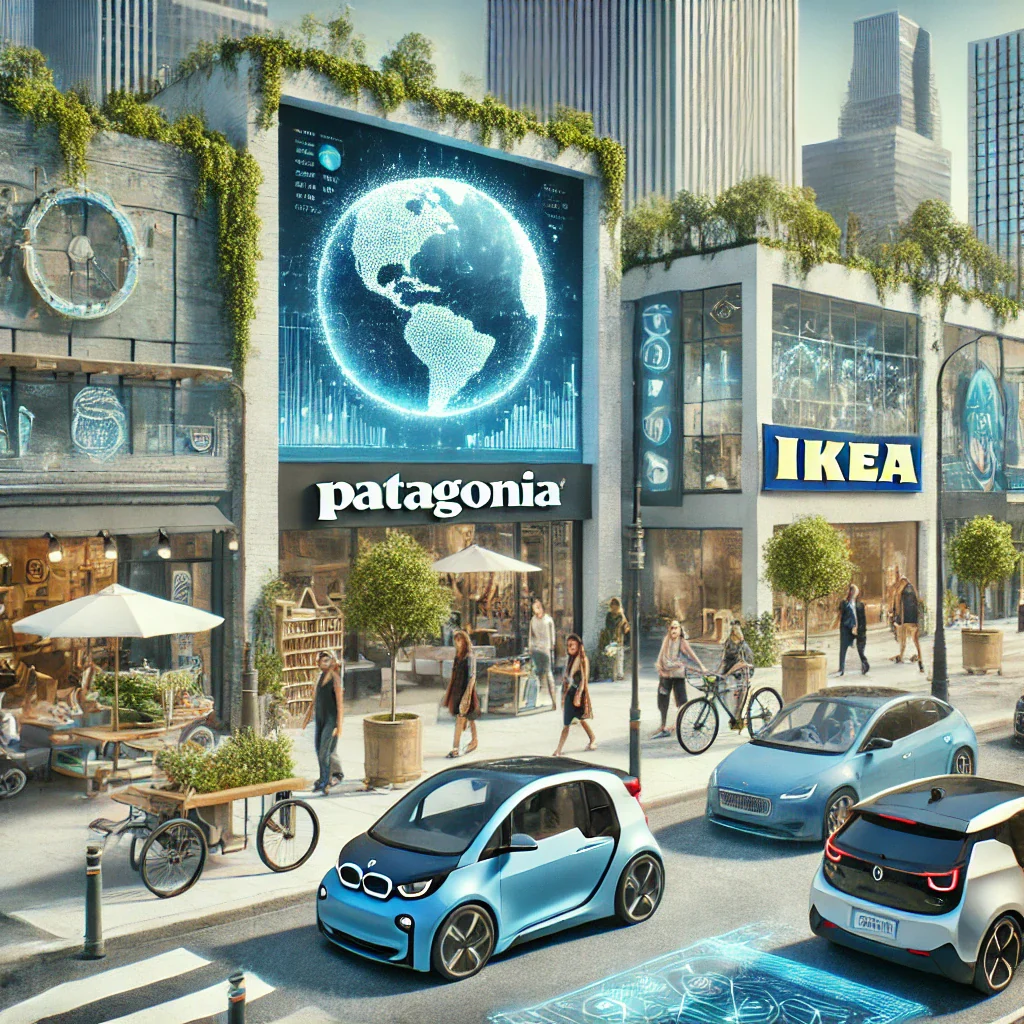In today’s marketplace, sustainability has emerged as a driving force reshaping consumer behaviour and market dynamics. As consumers become more environmentally conscious, businesses are adapting their marketing strategies to meet evolving demands for sustainable products and practices. This shift towards sustainability presents opportunities for brands to differentiate themselves, build trust, and drive growth by showcasing their commitment to environmental responsibility. In this blog, we’ll explore real-life case studies of successful sustainable marketing initiatives, highlighting how companies are leveraging sustainability to engage consumers, enhance brand reputation, and drive business success.
Brand Leaders in Sustainable Marketing
Patagonia: How did Patagonia’s “Don’t Buy This Jacket” campaign effect consumer behaviour? Patagonia is renowned for its steadfast commitment to sustainability and environmental conservation. The brand encourages individuals to champion its environmental initiatives by enrolling in ‘The Common Threads Initiative’—a program that advocates for mindful consumption: buying only what is necessary, repairing items that break, and reusing or recycling everything else.
“We’re dedicated to crafting high-quality products built to endure, which is why we offer a lifetime warranty on all our products,” explains EU Marketing Director Jonathan Petty. This lifetime warranty serves as an invaluable marketing strategy, epitomizing the brand’s dedication to longevity and sustainability in an era where disposable culture prevails.
A poignant example of Patagonia’s ethos is the “Don’t Buy This Jacket” campaign, which launched around Black Friday of 2021 and featured a message detailing why customers shouldn’t buy the jacket. The brand stated that the jacket required 6 gallons of water, emitted 20 pounds of carbon dioxide, and produced two-thirds of its weight in waste. Despite its intended message, the campaign paradoxically boosted sales by 30%, underscoring the complex relationship between consumer behavior and environmental awareness. This bold approach not only propelled sales but also catalyzed conversations about sustainable consumption—a testament to Patagonia’s influential role in shaping conscientious consumerism and effective marketing.
Tesla: What sets Tesla apart in the electric vehicle market?
Tesla revolutionized the automotive industry by prioritizing electric vehicles (EVs) and sustainable energy solutions. With a strong emphasis on the environmental advantages of EVs and substantial investments in renewable energy technologies like solar power, Tesla attracted environmentally conscious consumers and positioned itself as a leader in sustainable transportation. Under Elon Musk’s leadership, Tesla’s market capitalization surged past that of traditional automakers like Ford and GM, exceeding $600 billion. This extraordinary financial success underscores the viability of Tesla’s sustainability-focused business model, reflecting investor confidence in its innovative approach.
Despite premium pricing, Tesla’s Model 3 emerged as the top-selling electric vehicle globally, with over 500,000 units sold in 2020 alone. This remarkable demand highlights consumers’ willingness to invest in sustainable products, signaling a significant shift towards eco-conscious purchasing behaviour. A key factor in Tesla’s success lies in Elon Musk’s strategic decision to design electric vehicles as sports car models. Unlike previous attempts by competitors, which often focused on utilitarian designs, Tesla’s sleek and high-performance vehicles captured the imagination of consumers. This unique marketing tactic effectively differentiated Tesla from its competitors, enticing buyers with both sustainability and style—a winning combination that propelled Tesla to the forefront of the electric vehicle market.
IKEA: What makes IKEA’s transparency and education stand out in sustainability marketing?

IKEA has long been a pioneer in sustainability, implementing various initiatives such as offering energy-efficient products, reducing manufacturing waste, and promoting recycling and circularity. Their “People & Planet Positive” strategy aims to make IKEA a climate-positive business by 2030, resonating with eco-conscious consumers and fostering brand loyalty.
In recent years, IKEA’s commitment to sustainability has translated into tangible business success. Revenue growth has surged by 10% annually, propelled by the popularity of their sustainable product offerings, including energy-efficient appliances and eco-friendly furniture lines. Furthermore, consumer perception of IKEA has been overwhelmingly positive, with 75% of customers stating that the brand’s sustainability initiatives positively influence their perception of the company. These statistics highlight the significant impact that sustainability in marketing has on shaping consumer attitudes and behaviors. Transparency and education are notable among their marketing strategies. By providing detailed information about product sustainability, including materials used and environmental impact, IKEA empowers customers to make informed choices. For instance, wood is the material most commonly associated with IKEA furniture due to its renewable, recyclable, and durable nature. “At IKEA, we believe that when sourced responsibly, wood is a key driver for climate mitigation,” claims the Swedish giant. About 99.5% of the wood used for IKEA products is either Forest Stewardship Council certified or recycled.
Additionally, IKEA’s annual sustainability reports serve as transparent accounts of the brand’s progress and goals, fostering trust and accountability among stakeholders. Moreover, educational campaigns, such as those featured in catalogs and in-store displays, further reinforce IKEA’s commitment to sustainable living and inspire eco-conscious consumer behavior.
Unilever: What innovative marketing techniques does Unilever use to promote sustainability?

Unilever’s Sustainable Living Plan exemplifies its unwavering commitment to sustainability across its extensive brand portfolio. By embedding sustainability into product development, sourcing, and marketing strategies, Unilever has not only achieved notable reductions in greenhouse gas emissions and waste but has also spurred growth and enhanced brand value.
The success of Unilever’s sustainable brands, like Dove and Ben & Jerry’s, underscores the financial viability of sustainability-driven business practices. In 2020, these brands recorded a remarkable 46% higher annual growth rate and generated over 1 billion in revenue compared to their non-sustainable counterparts.
Consumer trust in Unilever’s sustainable brands remains impressively high, with 68% of consumers expressing greater trust in these brands compared to others. This statistic highlights the pivotal role of sustainability in cultivating consumer trust, fostering brand loyalty, and ultimately driving sales in a competitive marketplace.
A significant shift in the brand’s marketing ethos has been towards content creation. Unilever acknowledges the challenges consumers face in making sustainable choices due to a lack of accessible information. The company aims to address this issue by collaborating with partners to enhance the sustainability content produced by its brands and supporting creators in developing informative and actionable content. Together, they strive to simplify sustainable choices and make them the preferred option for consumers, aligning with Unilever’s overarching sustainability objectives and marketing techniques.
Burt’s Bees: What makes Burt’s Bees a leader in eco-conscious skincare and beauty? Burt’s Bees has set itself apart in the skincare and beauty industry by prioritizing natural ingredients, ethical sourcing, and eco-friendly packaging. Through transparent communication about sustainability efforts and partnerships with environmental organizations, Burt’s Bees has fostered a dedicated customer base passionate about eco-conscious choices.
This dedication to sustainability has translated into remarkable sales growth, with Burt’s Bees experiencing a 20% increase in sales of its natural and eco-friendly products. This growth surpasses the overall rate of expansion in the skincare market, highlighting the robust demand for sustainable beauty products and affirming the effectiveness of Burt’s Bees’ sustainability-focused approach. Furthermore, the brand has cultivated exceptional brand advocacy, with 85% of Burt’s Bees customers actively recommending the brand to others. This advocacy stems from the brand’s unwavering commitment to sustainability and natural ingredients, resonating deeply with consumers and driving word-of-mouth marketing.
Burt’s Bees strategically positions itself as a “green” and “natural” company, leveraging its marketing campaigns to underscore the sustainability and naturalness of its products. This branding strategy has been pivotal in creating strong brand recognition and fostering consumer trust in Burt’s Bees as a leading provider of eco-conscious beauty solutions.
Unlocking Sustainable Success: Key Takeaways from Industry Leaders
In delving into the success stories of Patagonia, Tesla, IKEA, Unilever, and Burt’s Bees, it’s evident that sustainability is not just a trend but a powerful driver of consumer engagement and brand loyalty. These leaders in sustainable marketing have showcased innovative strategies that resonate with environmentally conscious consumers, driving business success while making a positive impact on the planet.
As you reflect on these case studies, consider how your business can integrate sustainability into its marketing initiatives. How can you leverage transparency, education, and bold messaging to connect with consumers on a deeper level? Take notes from these pioneers and embark on your sustainability journey, knowing that each step towards environmental responsibility is a step towards a brighter future for both your brand and the planet. What will your next move be?








